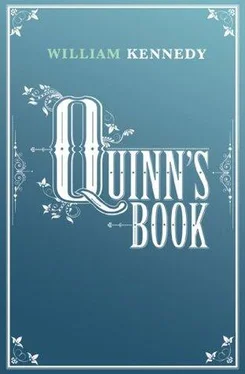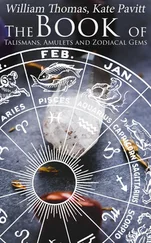Quinn’s mood elevated once he discovered his control over the word. He envisioned a thrilling future for himself, sitting alone in hotel rooms, ruminating on epic events, then imposing his conclusions on paper for the world to read in the morning newspaper. He felt a surge of power and also vague intimations of wealth. He made plans to hire a carriage and take Maud to the High Rock, the Iodine, and the Empire Springs, whose multiple chlorides, bromides, sulphates, phosphates, and bicarbonates of magnesia, iron, soda, strontia, and lime had been vitalizing and restoring the health of multitudes since the age of the Indian, most notably the health of the “high livers,” whose love of good food, abundant drink, and nocturnal revels was a proven ravagement. Quinn did not consider himself a high liver, but he intuited that he might become one; and Maud, too, though of a different order. Quinn’s intuitions about Maud had all the fixity of a cloud in high winds.
Quinn’s plan was this: hire the open carriage, promenade through the city to the springs, stop at an appropriate place for tea, and, while the carriage waited, stroll with Maud through the first available park, lead her into a wooded grove, throw your arms about her, kiss her passionately with lip and tongue, declare your eternal love for her face, her form, her brain, her soul.
Upon Quinn’s invitation to an outing at the springs, Maud brooded on the uncertainties that had been keeping her wakeful during recent nights. Most disturbing was the dream that had arrived after her talk with the emaciated man. Walking by a lake she saw a living, pulsating, disembodied eye sitting on a large rock. The eye was her own and when she reached for it to put it back in its socket it slithered through her fingers into the sand. She cupped it in the palms of her hands and as she lowered it into the water to rinse it, the eye swiftly melted into corrupt slime.
Maud read this as an omen of confusion, especially in regard to Quinn. It was true that only he and she would do each other justice in this life. But what but a proper botch would they make of an adolescent marriage? It was a peasant dream, laughable. Furthermore, Maud was mutating: communicating with herself through the techniques of Mesmer, willing herself into states that were alien to her waking self. Become a loveless Japanese wife, she would tell herself. Become a sibyl in the Delphic mode. Become a child of slaves at the auction block. Become an actress who works with Shakespeare himself. She would allow herself to pass hours of waking and sleeping in these foreign moods, and come away from them only reluctantly, and with written messages she could not reconcile. “The sadness of bumblebees and the longitude of pity exist only for lovers,” she wrote to herself. This poetic turn she found to be at odds with her pragmatic self, and pleasingly so. But her ability to communicate with the emaciated man was a disturbing extension of the condition, for it existed outside what she deemed the realm of the possible. She therefore disbelieved it, albeit hollowly: full of mocking echoes.
I must decide what to do about Quinn, Maud told herself, and so she fasted for the rest of the day, then set about making a dumb cake, as Magdalena’s Zincali Gypsy had taught her. She waited until Obadiah’s household was asleep and then in the kitchen she created her cake from eggs, salt, flour, and water in which she had lightly bathed her privities. She sat in silence with her back to the stove until it was time to take out the cake. She then revealed her breasts to the cake, covered herself, drew her initials with a knife on the top of the cake, and set it on the hearthstone in front of Obadiah’s drawing-room fireplace. She opened the front door of the house and left it ajar, sliced out a small piece of the cake for herself, and walked backward with it up the stairs to her room.
She put the piece of cake on her bedside stand, took off her dress, and unbuttoned her underclothing. She then ate the cake while standing, awaiting the spectral double of the man she would marry to enter the drawing room, carve his own initials on the cake downstairs, and perhaps then come up the stairs to pursue her with phantom hands. The loosening of her shift would allow her to free herself from such a grasp. He might get her underclothing, but not her. She would fall upon the bed at such an attempt, thus banishing him from the house.
The charm drugged her into sleep, and upon waking, and after inspecting the cake on the hearth at morning, she dressed herself and awaited the arrival of Quinn and his carriage.
Quinn walked through the village streets with Maud, envying the behavior of other strolling couples, all of whom seemed to be either in complacent love or in varied stages of flirtation. None seemed to exude the intensity of what he himself felt, and yet he could not touch Maud, not even her hand with his fingertips. Nor could he take hold of her arm to guide her; and so they walked as strangers along the grass-trimmed sidewalks, out of the area of stores, shops, hotels, and onto a street of stately homes and private gardens. At a wooded area past the last of the homes, Quinn stopped to regard the residue of a careless pic-nic: bits of bread, a strew of paper, a chicken bone, the core of an apple, a cork, a cigar butt, a woman’s handkerchief with a hole burned in it. An irrational sadness overtook Quinn.
“Look at that mess,” he said, shaking his head.
“The remnants of beauty,” said Maud, nodding.
Quinn and Maud were entering a new condition. Despairing of more intimate conversation, Quinn told her of a story he was writing about John the Brawn and that Calvin Potts was interested in printing in his newspaper.
“You will be very good at what you do,” Maud said. “I myself am riding horses again for the first time since we lived in Spain. Obadiah has wonderful horses.”
“I’ve never been on the back of a horse,” Quinn said.
“It’s a majestic experience,” said Maud.
Quinn nodded, uncertain of the meaning of “majestic,” and how riding a horse could be conducive of that.
“We ought to walk through the woods,” Quinn said, and in a gesture that defied the static present tense of his life he grabbed Maud’s hand and stepped over the pic-nic leavings and onto a path that led he knew not where.
“You want me to walk in the woods?” said Maud.
“Are you so delicate?”
“I’m not at all delicate.”
“Then we’ll go into the woods,” said Quinn. “I don’t like what’s been going on with you today.”
“Nothing has been going on with me.”
“Nothing indeed, and more nothing. What I expect from you is something. I expect you to love me as I love you. I expect you to want to kiss me and hold me as I want to kiss and hold you.” Quinn thought he might have stolen this line from a poem.
“Yes,” said Maud. “I understand that. But what happened is that I spent the night baking a dumb cake to find out how to behave with you.”
“Why would you bake a dumb cake? Why wouldn’t you bake a smart cake if you wanted to know something?”
“All cakes are dumb.”
“I think I always knew that.”
“The true dumb cake helps you discover who will be your husband.”
“Ah, I see,” said Quinn. “More spirits.”
“If you like.”
“What do you do with a dumb cake after it’s baked?”
“You put your initials on it, you eat some of it, and you wait for your future husband’s double to come and also put his initials on it.”
“And that’s it?”
“No,” said Maud, and she paused. “You also show your breasts to it.”
“You show your breasts to a cake?” said Quinn.
“That’s part of the ritual.”
“It would make more sense if you showed your breasts to me, if I’m going to be your husband.”
Читать дальше












